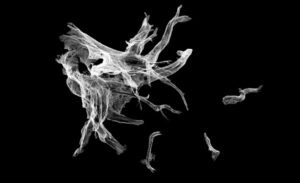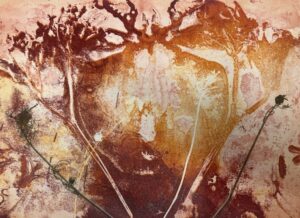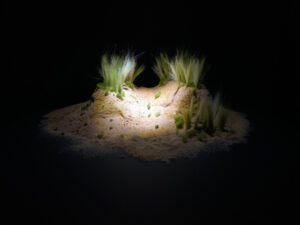It’s Showtime: UON Fine Art Exhibition Event – 5-12 September
Date 1 September 2023
1.09.2023We invite the public, fellow peers, and academics to come and see the exhibition which is the culmination of our learning and development throughout our Master's Degree.
Fine Art student work
This is part 2 of a blog series about the artwork from Fine Art students. Read part 1 for more student work.
Matthew Beesley
Matthew’s work is predominantly site-specific, working within landscape art tradition, whilst utilising both rural and urban geographical spaces. To explore parallels between art and geographical spaces, ideas of perception, endurance, metamorphosis, often with literary devices and metaphor.
The noumenal and somatic qualities of place are also explored through painting, drawing, sculpture and printing.

Charlie Horry
Charlie is a graduate of History of Art and a Printmaker. Having spent the last 18 years as an Art and Photography teacher, she made the decision that for her 40th year she was going to reinvigorate her creativity and applied for the Master’s Course in Fine Art at the University of Northampton. This has reopened the art world for her.
“From extending my own practise, knowledge of Art Theory and being part of a collaborative exhibition has reawakened my passion for the arts. I had spent many years channelling my energy into moulding younger talent that I’d almost forgotten about herself and my own creative needs.”
During her Master’s she has been enquiring into what aspect and interest she finds from the printed surface, creating abstracted form through etching, lino and collagraph printing. Charlie has been developing her work by trialling different ways of applying texture to printing plates.
“The textural impression of the surface has become as important as the original imagery and this has begun to direct my aesthetic inquiry and direction.”
Her current series ‘Trace’ is based on palimpsest and the metamorphosis of the original surface material. The image has been developed from her investigation into techniques in etching using the grid as imagery. She transformed the 2D representation of a grid into a 3D net using stitch to make a more fluid and undulating form. Charlie has also used the same net object to use as an emboss in some surfaces to create tactile qualities and to play with the surface plane.

Kaiya Khatri
Kaiya’s practice has been rooted in exploring different methods of preserving impressions of nature in print. The key themes of her practice are embedded in highlighting the delicacy, intricacy and detail of flowers. Through in-depth exploration of various print mediums, she aimed to preserve and suspend in time the beauty of flowers. There has been an evolution in her practice that has come to focus on the beauty, form and sublimity in nature. In the beginning she wanted to continue pursuing the ways nature could be perfectly captured in print but as her work evolved, she began to explore the ambiguity within the work and the way it could be interpreted by a viewer.
Kaiya was used to working in parameters that were full of chance encounters and used fluid materials. Her undergraduate degree show was embedded in showcasing flowers and their beauty in many different formats from naturally dyed handmade paper to cyanotype prints. She was used to working in a certain way but after coming to the University of Northampton her surroundings and equipment changed enabling her to further develop her skills and explore avenues she hadn’t tried before. Kaiya encountered etching processes such as soft ground, hard ground, photo etchings and lino cuts using new machinery and methods.
“As a print maker my skill set is rooted in these processes and I was able to incorporate new ways to adapt the methods to my needs and outcomes. My work has changed and developed enhancing my attention to detail, decision making and ability to understand my materials as an artist.

Martyn Steele
“Echoes of Memory: A Journey into Nostalgia”
In this body of work Martyn explores the nostalgia of the little things we remember and the simple memories they evoke.
From the first experience of climbing up a slide to running to sea as a child, Martyn encourages the viewer to look through a peep hole to explore the distortion of how our memories distort over time.

